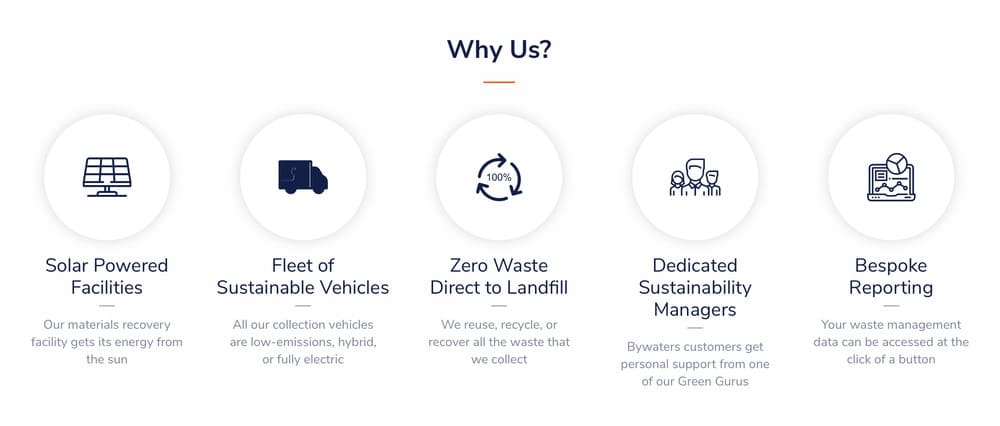In today’s business environment, effective waste management is not just a regulatory requirement but also a key aspect of corporate social responsibility. Bywaters, a leading waste management company in the UK, offers tailored solutions for businesses of all sizes. However, understanding the pricing structure for their services can be a bit complex. This article will break down Bywaters’ commercial waste management pricing to help you make an informed decision for your business.
Overview of Bywaters services
Bywaters provides comprehensive waste management services, including general waste collection, recycling services, and specialised waste disposal (such as hazardous waste). They focus on sustainability, aiming to divert as much waste as possible from landfill by promoting recycling and waste-to-energy processes.

Factors influencing Bywaters’ pricing
Bywaters’ commercial waste management prices are influenced by several factors, which can vary significantly depending on your business’s specific needs:
- Type of waste: The nature of the waste your business produces will directly impact the cost. General waste is typically less expensive to manage than hazardous or specialised waste. Recycling services can be more cost-effective, especially if your business generates large volumes of recyclable materials.
- Volume of waste: The amount of waste your business produces will affect the frequency of collections and the size of the containers required. Bywaters offers a range of containers, from small bins to large skips, each with its pricing model.
- Collection frequency: How often you need your waste collected will influence the price. Businesses that require daily collections will naturally incur higher costs than those with weekly or bi-weekly needs.
- Location: The geographic location of your business can impact pricing due to transportation costs. Businesses in remote areas may face higher charges compared to those in urban centres where Bywaters operates more frequently.
- Service customisation: Bywaters offers bespoke waste management solutions tailored to specific industry needs. Customisation might include tailored recycling programmes, waste audits, or staff training, which can all impact the overall cost.
Bywaters pricing list
| Service Type | Container Size | Collection Frequency | Approximate Cost per Collection | Additional Notes |
|---|---|---|---|---|
| General Waste | 240L Bin | Weekly | £10 – £15 | Prices vary based on location and volume. Additional charges for excess waste may apply. |
| General Waste | 1100L Bin | Weekly | £35 – £50 | Ideal for larger businesses with substantial waste output. |
| Mixed Recycling | 240L Bin | Weekly | £8 – £12 | Lower cost compared to general waste due to recycling incentives. |
| Mixed Recycling | 1100L Bin | Weekly | £25 – £40 | Suitable for businesses focusing on sustainability. |
| Cardboard Recycling | 240L Bin | Bi-weekly | £5 – £8 | Cost-effective option for businesses with high volumes of cardboard waste. |
| Food Waste | 240L Bin | Twice Weekly | £12 – £18 | Essential for hospitality businesses; composting options available. |
| Hazardous Waste Disposal | 20L Container | On-demand | £50 – £80 per collection | Includes specialised handling and compliance with regulations. |
| Confidential Document Shredding | Secure Shredding Bag | On-demand | £25 – £40 per bag | Includes secure collection, shredding, and certification of destruction. |
| Skip Hire | 6 Yard Skip | One-off | £150 – £250 | Ideal for construction projects; includes delivery, collection, and disposal fees. |
| Waste Audit and Reporting | N/A | Annual | £500 – £1,000 | Provides detailed waste analysis and compliance reporting. |
Notes:
- Container Size: Sizes are given in litres (L) or yardage (for skips).
- Collection Frequency: The frequency of waste collection can significantly impact costs. This example assumes a typical schedule but can be adjusted to meet business needs.
- Approximate Costs: These figures are indicative and may vary based on location, service customisation, and contract terms.
- Additional Notes: Additional fees may apply for excess waste, special handling, or compliance-related services.
Typical pricing structures
While Bywaters does not provide a one-size-fits-all pricing list due to the bespoke nature of their services, there are some general pricing structures that can help you estimate costs:
- Per collection: For businesses with relatively stable waste output, Bywaters may charge on a per-collection basis. This pricing is often used for general and recyclable waste, with fees varying based on container size and waste type.
- Fixed monthly fees: Businesses that generate consistent waste volumes may opt for a fixed monthly fee. This arrangement can simplify budgeting and ensure regular service without fluctuating costs.
- Pay-as-you-go: This option is ideal for businesses with irregular waste production. You pay only for the collections you use, which can be cost-effective for seasonal operations or those with varying waste output.
Additional considerations
Beyond the basic costs of collection and disposal, there are a few additional factors that may influence your total expenditure:
- Environmental levies: The UK government imposes landfill taxes and other environmental levies to encourage recycling and waste reduction. These charges are often passed on to businesses and are reflected in Bywaters’ pricing.
- Compliance and reporting: Bywaters provides waste reporting services, which are essential for businesses aiming to comply with environmental regulations. While this is a valuable service, it may add to the overall cost.
- Recycling rebates: If your business produces a significant amount of recyclable waste, you might be eligible for rebates. Bywaters can facilitate these rebates, potentially offsetting some of the waste management costs.
Cost optimisation tips
To optimise your waste management costs with Bywaters, consider the following strategies:
- Conduct a waste audit: Understanding the types and volumes of waste your business generates can help tailor the most cost-effective waste management plan. Bywaters offers waste audits as part of their service, which can identify opportunities for cost savings.
- Maximise recycling: Increasing the proportion of recyclable waste can reduce the overall cost of waste management. Bywaters can provide customised recycling programmes to help businesses achieve this.
- Review service frequency: Regularly reviewing your collection frequency and adjusting it based on actual needs can prevent over-servicing and reduce costs.
- Engage with Bywaters’ sustainability initiatives: By partnering with Bywaters on sustainability initiatives, your business might access additional resources or incentives that can further reduce waste management costs.
Bywaters pricing review – Our verdict
Bywaters offers a flexible and comprehensive waste management service tailored to the needs of UK businesses. Understanding the various factors that influence their pricing can help your business make informed decisions and optimise waste management costs. Whether you require regular waste collection or bespoke recycling solutions, Bywaters’ focus on sustainability ensures that you can meet both your operational needs and environmental responsibilities.
For the most accurate pricing, it’s recommended to contact Bywaters directly to discuss your specific requirements and obtain a customised quote.
For more, visit the Bywaters website.
Bywaters pricing FAQ
Bywaters determines the cost for general waste collection based on factors such as the size of the container and the frequency of collection. For example, a 240L bin collected weekly typically costs between £10 and £15 per collection, while a larger 1100L bin might cost between £35 and £50 per collection.
Yes, Bywaters may apply additional charges, such as for excess waste or for specialised services like hazardous waste disposal. For instance, hazardous waste disposal using a 20L container can cost between £50 and £80 per collection, depending on the specific waste type and regulatory requirements.
Bywaters does offer more competitive pricing for recycling services. For example, businesses that utilise a 240L bin for mixed recycling collected weekly may pay between £8 and £12 per collection, which is typically lower than the cost of general waste collection.
Bywaters charges between £25 and £40 per bag for confidential document shredding, depending on the volume and the security level required for the service. This fee includes secure collection, shredding, and a certificate of destruction.
Bywaters charges between £500 and £1,000 for a comprehensive waste audit. This service includes detailed analysis of waste streams, recommendations for waste reduction, and compliance reporting, tailored to the specific needs of your business.
Bywaters’ food waste collection typically costs more than mixed recycling but less than hazardous waste disposal. For instance, a 240L bin for food waste collected twice weekly costs between £12 and £18 per collection, reflecting the specialised handling required for organic waste.
Bywaters charges between £150 and £250 for hiring a 6-yard skip for construction waste. This price includes the delivery of the skip, collection, and disposal fees, but may vary depending on the duration of the hire and the specific location.
Yes, Bywaters may adjust pricing based on your business’s location due to transportation and logistical costs. Businesses in urban centres may have lower costs, while those in remote areas might pay slightly higher rates. For example, the cost for a 240L general waste bin collected weekly might be at the lower end of the £10 to £15 range in a city, but closer to £15 in a more remote area.
Bywaters offers pay-as-you-go options for businesses with irregular waste collections. This pricing structure allows businesses to pay only for the collections they use, which can be particularly cost-effective. For example, a one-off collection using a 240L bin might cost around £15.
Bywaters charges between £5 and £8 per collection for cardboard recycling using a 240L bin, collected bi-weekly. This service is designed to be cost-effective for businesses that generate significant volumes of cardboard waste.

